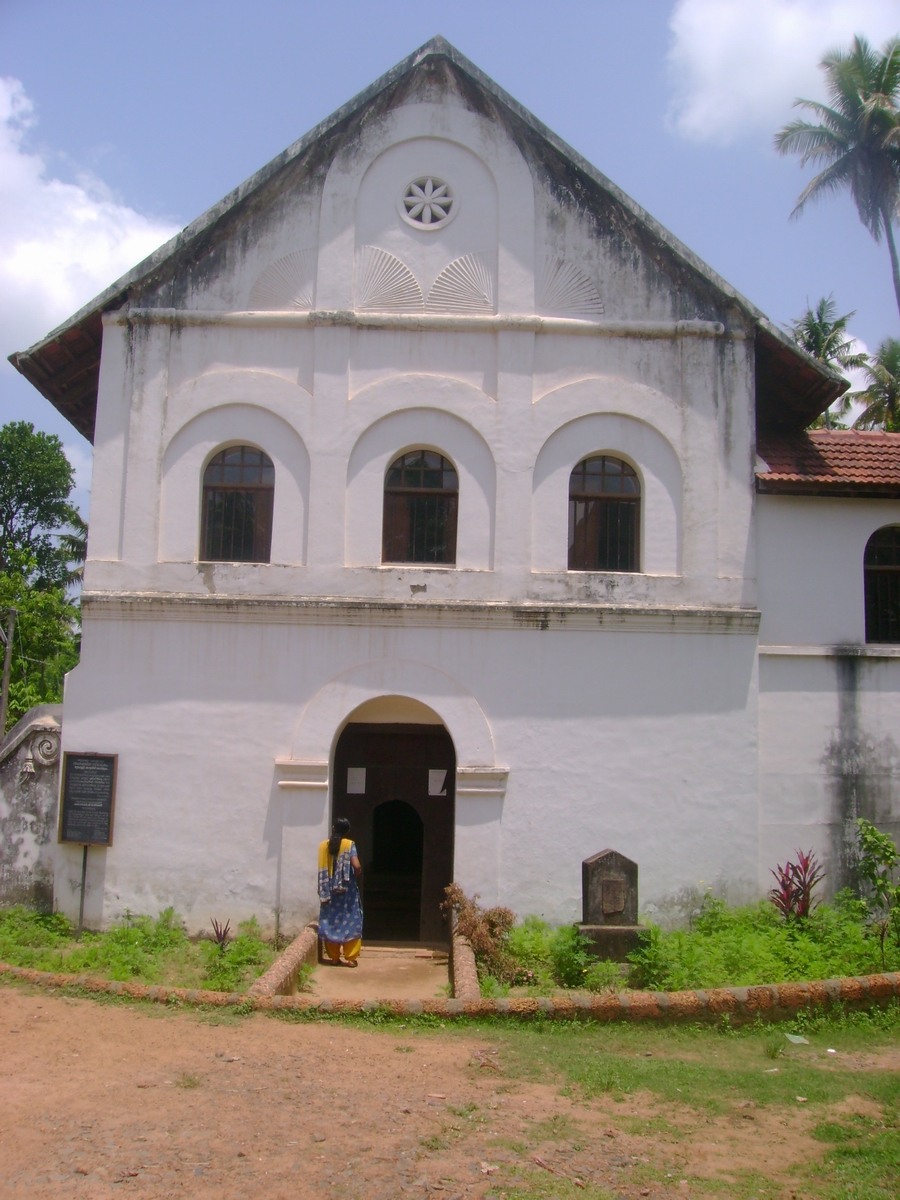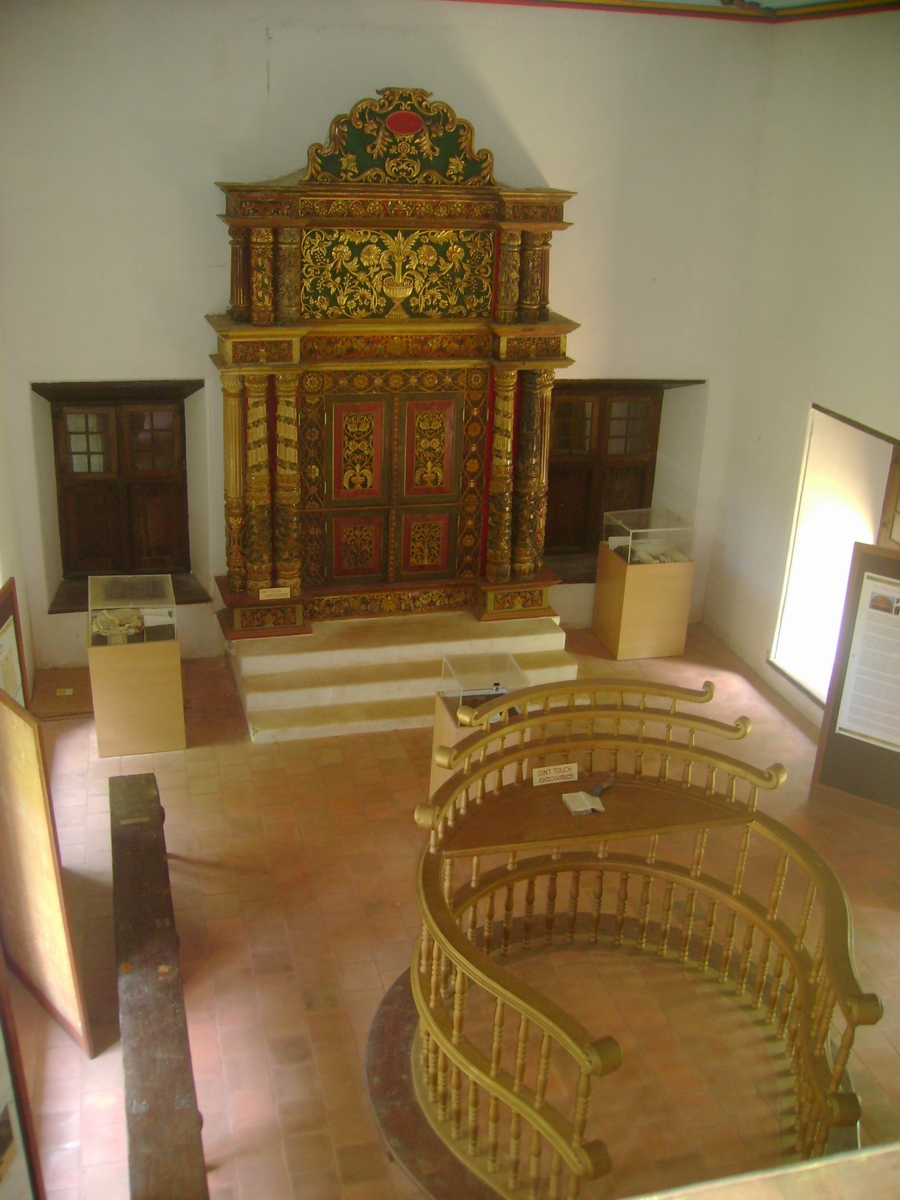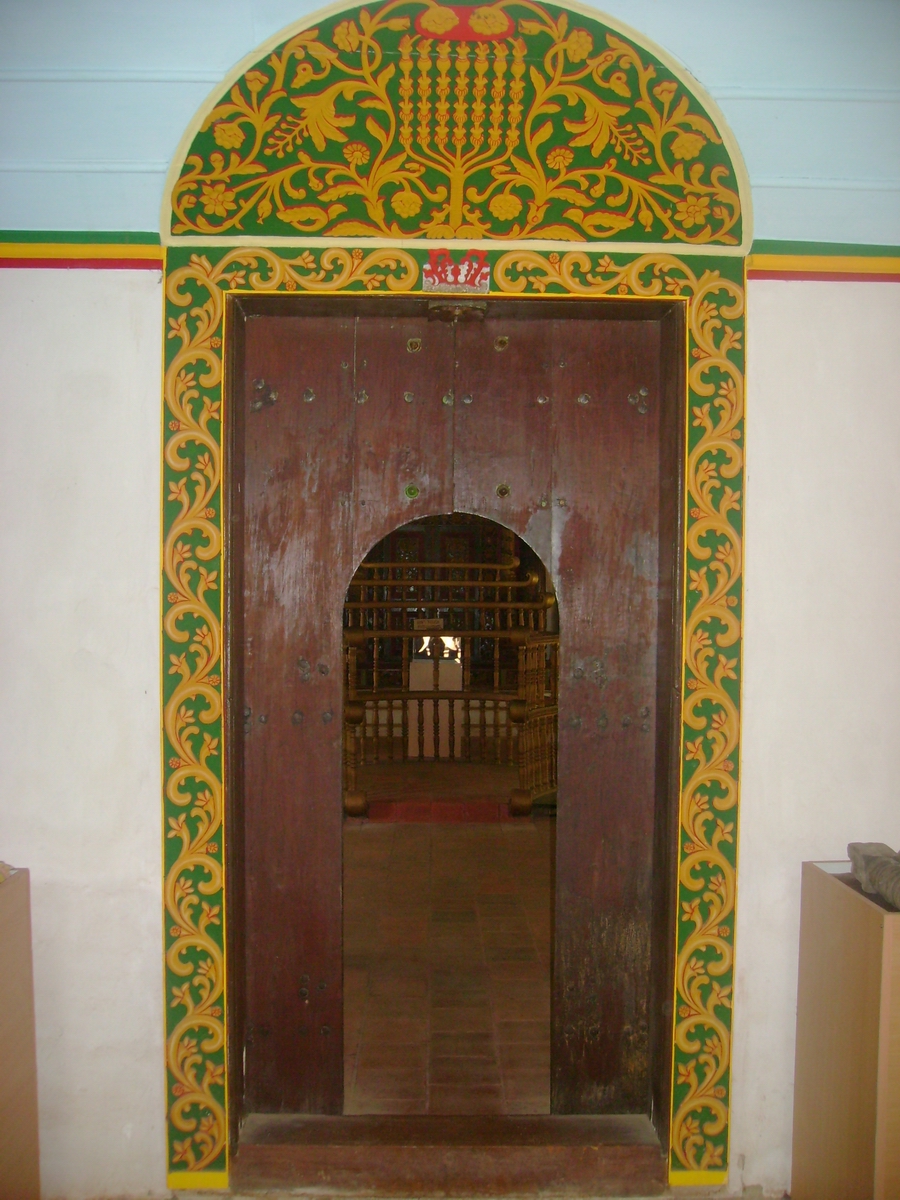|
The Jews of Chennamangalam

|
| The Chennamangalam Synagogue |
The Jews of Cochin have lived on the Malabar coast for centuries, some say from
the time of King Solomon. Others claim that the Jews arrived in the first century A.D. after the destruction of the Second
Temple. In a popular Christian tradition, St. Thomas arrived on the Malabar coast and was invited to the wedding of the daughter
of the King of Cranganore. There, St. Thomas sang a Hebrew bridal song which none of the company could understand, except
a Jewish flute girl. After the wedding, St. Thomas retired to the Jewish quarter in Cranganore, where he took up residence.

|
| The beautiful Ark and the pulpit of the synagogue |
This local Christian narrative confirms the existence of Jews on the Malabar coast as early as the first century.
Local tradition also has it that in 1341, after the harbour of Cranganore silted up, the Jews moved from Cranganore to Chennamangalam
and other centres.
Cranganore was also known as Shingly. To this day, the Jews of Chennamangalam, like the other Cochin Jews, follow
the Sefardi liturgy, but pray according to the "Shingly rite". According to the scholar P.T. Nair,the kingdom of Shingly (a
corruption of Tiruvancikulam where the Perumals had their seat of Government in ancient Kerala) is that part of Cranganore
town which goes by the name of Kottapuram today.
The medieval geographer Ibn Battuta (13071377) mentions Jewish settlement in Malabar five days journey from
either Calilcut or Kawlam (Quilon) via KunjaKari.
He describes this place, "which is on top of a hill; it is inhabited by Jews, who have one of their own number
as their governor, and pay a poll tax to the sultan of Kawlam."
P.M. Jussay analysed Cochin Jewish folksongs in Malayalam, and identified KunjaKari with Chennamangalam,
on the basis of the location of the summit and the Jewish selfrule. As is well known, the Jews of Cochin received copperplates
from Bhaskara Ravi Varman (9621020 C.E.) granting them 72 privileges: the right to use a day lamp and a decorative cloth to
walk on; the privilege of blowing a trumpet and erecting a palanquin; and the right to obtain exemption and collect particular
taxes. These privileges were bestowed upon the Cochin Jewish leader Joseph Rabban for "as long as the world, sun and moon
endure".
In the Cochin Jewish Malayalam song, "The Song of Everayi", Jussay traces the migration of the Jews from Jerusalem
through Egypt, Yemen and Persia to Palur, north of Cranganore, whence they moved to Chennamangalam. There, according to the
song, Evarayi, the Jew, joined the local aristocratic Nayars in a deer hunt, which Jussay interprets as signifying that the
Jews were accepted as members of the nobility.
In "The Song of the Bird", which recounts the transmigration of a bird to India in search of a guava fruit,
the bird flies "to a green mansion…in an elevated spot", which Jussay identifies with the hill at KunjaKari in Chennamangalam.
This interpretation would tally with the conclusion drawn by P. Anujan Achan, the Kerala State Archaeologist of Cochin, in
1930. In his discussion of the Hebrew inscription on the abovementioned tombstone of Sara, the daughter of Israel, he concluded
that the Jews must have migrated to Chennamangalam from Cranganore around the
date of the inscription in the midthirteenth century.
In "The Song of Paliathachan", also recited by the Jews of Cochin, Jussay claims that the Paliath Achan represented
the Chennamangalam Nayar noblemen, who bestowed upon the Jews, in the words of the song, "gifts and books to all those who
come, and titles to foreigners". The Paliath Achan reigned in Chennamangalam until 1809. Visitors to the village can still
find the Paliyam Palace, the abode of the famous Achans of Paliyam, who were hereditary prime ministers of the Maharajahs
of Kochi Kottayil Kovilakom.
Their palace is situated on a hill overlooking the places of worship of four major world religions: the Hindu
temple, the Muslim mosque, the Christian church and the Jewish synagogue.
The Chennamangalam synagogue was constructed in 1614, during the period of the Portuguese Inquisition. It was
surrounded by a high wall, either for safety or to mirror the wall encompassing the Paliyam palace.
The Jews of Chennamangalam lived side by side with their neighbours in harmony and tolerance for over 350 years.
They believed in monotheism, yet respected the customs of the peoples of other religions. They observed all the major Jewish
festivals, fasting on the Day of Atonement, and baking matzot (unleavened bread) on Passover.
A distinctly South Indian flavour permeated some of the rituals. For example, on Simchat Torah, the festival
of "Rejoicing of the Law", the Jews of Chennamangalam, like the other Cochin Jews, erected a temporary Ark, or manara in Jewish Malayalam, in front of the synagogue heichal (Ark) for the thorah scrolls, the holiest books
of the Jews. The scrolls were displayed throughout the holiday with their silver and gold covers, adorned with jasmine garlands.
Social life was built around the community (yogam) and the extended family. All the Jewish children in Chennamangalam,
boys and girls alike, attended the Talmud Torah (school for reading, writing and Torah), located on the upper floor of the
synagogue.
Chennamangalam; in 1950, there were only 46 families in the village. In 1948, the State of Israel was declared.
The Cochin Jews, who had always recited prayers for the return to Zion, decided en masse to immigrate to the new state. In
1949, when the first group of 17 Jews left the Malabar coast for Israel, it included members of the Chennamangalam community.
By the end of the twentieth century, all the Jews of Chennamangalam had departed.

|
| The main entrance |
Click here for more on Chennamangalam Synagogue
|

